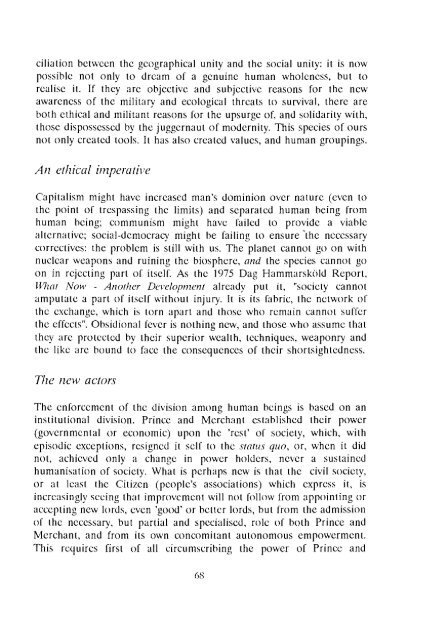ifda dossier 74 - Dag Hammarskjöld Foundation
ifda dossier 74 - Dag Hammarskjöld Foundation
ifda dossier 74 - Dag Hammarskjöld Foundation
Create successful ePaper yourself
Turn your PDF publications into a flip-book with our unique Google optimized e-Paper software.
ciliation between the geographical unity and the social unity: it is now<br />
possible not only to dream of a genuine human wholeness, but to<br />
realise it. If they are objective and subjective reasons for the new<br />
awareness of the military and ecological threats to survival, there are<br />
both ethical and militant reasons for the upsurge of, and solidarity with,<br />
those dispossessed by the juggernaut of modernity. This species of ours<br />
not only created tools. It has also created values, and human groupings.<br />
Capitalism might have increased man's dominion over nature (even to<br />
the point of trespassing the limits) and separated human being from<br />
human being; communism might have failed to provide a viable<br />
alternative; social-democracy might be failing to ensure "the necessary<br />
correctives: the problem is still with us. The planet cannot go on with<br />
nuclear weapons and ruining the biosphere, and the species cannot go<br />
on in rejecting part of itself. As the 1975 <strong>Dag</strong> Hammarskdd Report,<br />
Winr Now - Another Development already put it, "society cannot<br />
amputate a part of itself without injury. It is its fabric, the network of<br />
the exchange, which is torn apart and those who remain cannot suffer<br />
the effects". Obsidional fever is nothing new, and those who assume that<br />
they tire protected by their superior wealth, techniques, weaponry and<br />
the like are bound to face the consequences of their shortsightedness.<br />
The new actors<br />
The enforcement of the division among human beings is based on an<br />
institutional division. Prince and Merchant established their power<br />
(governmental or economic) upon the 'rest' of society, which, with<br />
episodic exceptions, resigned it self to the status quo, or, when it did<br />
not, achieved only a change in power holders, never a sustained<br />
humanisation of society. What is perhaps new is that the civil society,<br />
or at least the Citizen (people's associations) which express it, is<br />
increasingly seeing that improvement will not follow from appointing or<br />
accepting new lords, even 'good' or better lords, but from the admission<br />
of the necessary, but partial and specialised, role of both Prince and<br />
Merchant, and from its own concomitant autonomous empowerment.<br />
This requires first of all circumscribing the power of Prince and
















